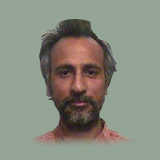
Dr Hikima Baah
Course Director
University of Sussex Business School
Talk to our Admissions Team
Enquire nowUnderstand complex sustainability challenges and develop the interdisciplinary skills needed to develop solutions for your business, sector and society.
 Delivered 100% online
Delivered 100% online The world’s biggest challenges can only be tackled with innovative, inclusive, and system-wide solutions.
Our 100% online Masters will equip you with the interdisciplinary skills and insights you need to develop these solutions, and lead sustainable transformation in your business, sector and society at large.
On this action-focused course, you will:
Ranking 1st in the world for Development Studies (QS World University Ranking 2017-2025), the University of Sussex is renowned for its research and teaching in sustainability.
As a Masters student, you’ll benefit from this unrivalled expertise, learning from academics across Sussex’s Science Policy Research Unit (SPRU), School of Global Studies and Institute of Development Studies (IDS). The course curriculum evolves to reflect the findings and insights from these research centres, so you’ll graduate with an awareness of the very latest developments in the sector.
Our online Sustainable Development Masters is a flexible, part-time course that can be completed in as little as two years, with the option to extend this to four if you need to pause your studies.
Meet some of our inspiring distance learners, hear their reasons for choosing our sustainability course at Sussex, and discover how they fit their studies into their busy lives.
Hi. I’m Helen, and I’m studying online for a Masters at the University of Sussex for Sustainable Development.
I think studying online was a really good option to kind of keep my full-time job and really study when it works for me.
The most important thing for me is really that my career has a positive impact on the world and on environmental issues in particular. So, the Sustainable Development course is giving me some great insight on the, kind of, complexity of sustainability issues and teaching me the practical skills that I’m going to need to work as an environmental professional and that could be in policy, consulting, NGOs, anything like that.
What I’ve really felt on this online course is that the learning materials are such a high quality. And there’s a really, really great online learning platform. They prepare, kind of, really consumable content for us on what we should be learning and what the key kind of concepts, issues, solutions are that we need to be aware of.
So I really appreciate all the effort that they’ve put in, you can definitely notice it. And yeah, they’re very engaged in the workshops that they offer. They often invite in guest lecturers from around the University who might not be teaching an online course so that we can get kind of more access to those world-leading academics who are all amazing.
I’m always shook when I’m writing a paper about something and I realise that the academic who wrote that theory works in my department, so that’s always really cool.
And I definitely feel like once I finish the course I’ll be in a place where I can really confidently walk into that job interview and say I deserve this job, and it’ll really be true as well.
The online experience allows you to continue your studies while at work or whatever family commitments you’ve got. And definitely Sussex has got a good reputation, particularly within SPRU and International Development, and I think that was reflected in the experience we had as students.
A couple of anxieties I had before I started the course was, how does it all work? But it was all very simple. Within the first week you go on there, it’s all very easy to use and navigate. Any questions I had, I was able to ask the Student Success Team and they get back to you very promptly.
What I’ve really felt on this online course is that the learning materials are such a high quality and there’s a really, really great online learning platform. They prepare, kind of, really consumable content for us on what we should be learning.
Different methods of learning definitely helped. I found that podcasts for me were really helpful to get information in because often just reading a lot of information is quite difficult to get in but listening and visual aids really helped.
I found it great if I’m watching videos and lectures to be able to fast forward them, pause them, rewind them and to have all those materials there to refer to as and when you need them.
I think it’s really great that the cohort is international for the online course so I’ve made amazing professional connections with people working in Canada, Asia, all over Europe, as well as all over the UK.
To graduate from this sustainability course, students must successfully complete all 11 core modules plus one of the optional modules below. All have been designed to deepen your expertise in sustainable development, combining independent study with live seminars and group work.
Each module lasts for seven weeks with the final module assessment deadline usually on the Monday of Week 8. Students should allow for 20 hours per week study time.
Assessments will take place throughout each module and must be completed within the module teaching period for students to progress through the course/to the next module.
The assessments in this course are designed to measure your understanding and progress. Examples of the types of assessments you may encounter include projects, written assignments and practical exercises. The assessment information will be shared with you at the start of each module. It’s vital to complete these within each module’s teaching period to stay on track. The final assessment is due by 10am on the Monday after teaching finishes.
An indication for the likely assessment methods of each module is given, though this may be subject to change.
A lower second-class (2.2) undergraduate honours degree or above from any UK university or international equivalent.
Follow our step-by-step guide on how to apply for an online Masters course.
English language requirements
Applicants whose first language is not English (and whose first degree was not taught in English) need to supply evidence of IELTS (Academic) high level (6.5 overall, including at least 6.0 in each component).
Sustainable Development MSc (online) course fee: £12,960
Cost per module: £1,080
Fees can be paid at the start of the course or on a module-by-module basis. Students must pay the first module fee of £1,080 to secure their place on the course.
Course fees will remain fixed for 24 months from your initial course start date. Thereafter, the course fee will rise at a rate of 2.5% per calendar year (subject to rounding for administration purposes).
Please visit our fees and funding page for more information.
20% alumni discount
If you have previously graduated from an undergraduate, postgraduate or PhD course at the University of Sussex, you will be eligible for a 20% discount on this online course. (Terms and conditions apply.)
Find out more about the alumni discount and eligibility criteria.

Course Director
University of Sussex Business School

Course Director
University of Sussex Business School

Lecturer

Lecturer
University of Sussex Business School

Professor Of Energy Policy
University of Sussex Business School

Professor Of International Relations
School of Global Studies

“Being ranked number one in the world for the ninth year in a row is a fantastic achievement for the University and a world-wide recognition of our commitment to research and teach the most pressing global development issues of our times.”